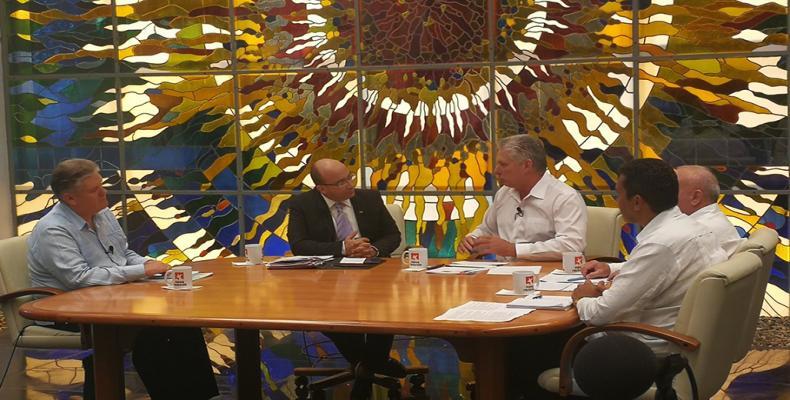By Charles McKelvey
The President of the Council of State and Ministers, Miguel Díaz-Canel, and ministers of the government, appeared on the television news program, The Round Table, on Wednesday and Thursday, in order to explain to the people the new aggressive measures against Cuba by the Trump administration, the impact that they have had on the availability of diesel fuel, and the adjustment measures that are being adopted by the government.
Accompanying the president were Alejandro Gil Fernández, Minister of Economy and Planning; Raúl García, Minister of Energy and Mines; and Eduardo Rodríquez, Minister of Transportation.
The President explained that the Trump administration has been threatening shipping companies, the governments where the ships are registered, and insurance companies that are parties to the contracts. As a result of the constant threats, some entities have withdrawn, which has created a temporary situation of a shortage of diesel fuel. The President and the Minister of the Economy stressed that the shortage is temporary. The Cuban government has contractual agreements for the delivery of fuel at the end of September; it is expected that the situation will return to normal in October. Díaz-Canel stressed that the situation pertains only to energy; ships with food supplies are arriving to the island. Gil Fernández noted that, since the U.S. government will continue its aggressive policies, other situations may emerge in the future.
The adjustment measures include the reduction of inter-city bus routes, making greater use of railroad transportation; the reduction of bus routes in the City of Havana; the adoption of saving measures in places of work, such as changing the hours of work in order to diminish energy consumption during peak hours, and working at home through the Internet; delaying the transportations of goods that are not vital to the population, giving emphasis to the transportation of basic goods; and temporarily suspending or reducing the production of goods that require high levels of energy.
Díaz-Canel and Gil Fernández stressed that the country is not entering another Special Period, because the economic conditions of the country are different from those of the early 1990s. Today, Cuba has a diversity of trading partners and foreign investors and a capacity to generate international currency through industries like tourism and the exportation of medical services and technologies.
On Friday, Díaz-Canel undertook a tour of the City of Havana, in order to evaluate the impact of the measures on the population. Other members of the Council of Ministers traveled to the provinces of the country in order to analyze the measures.


